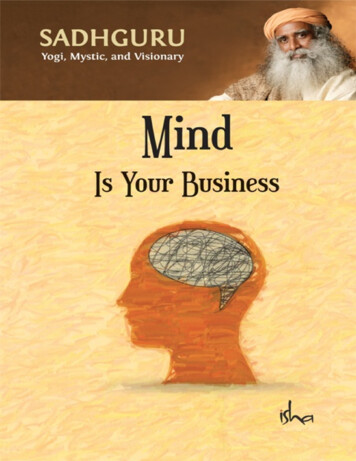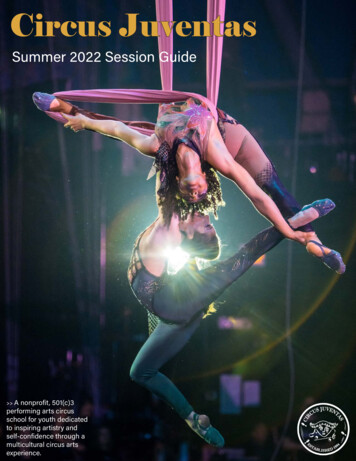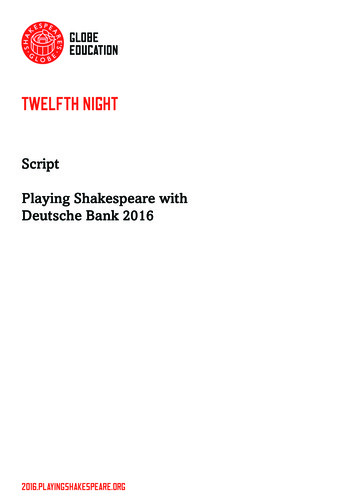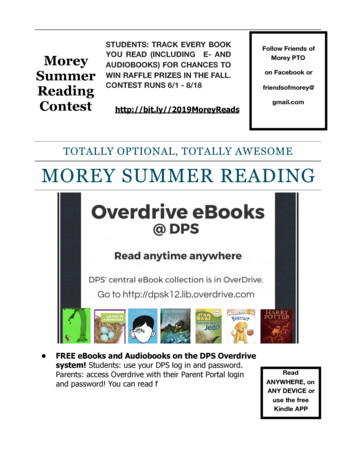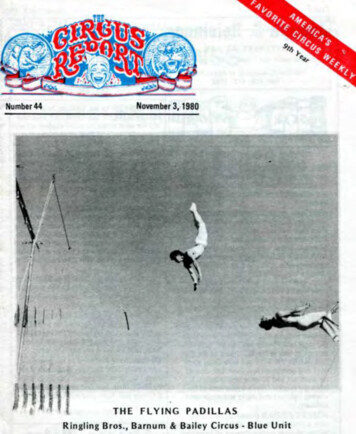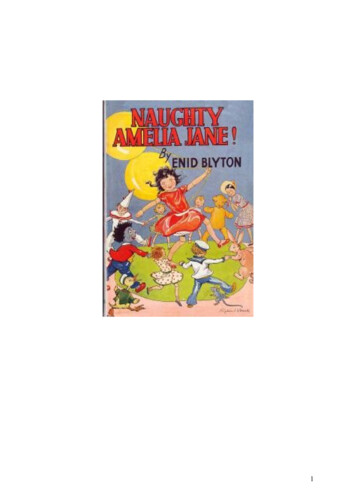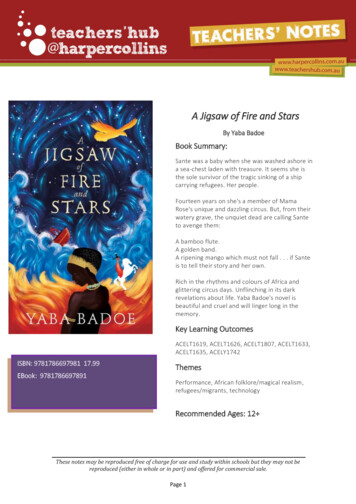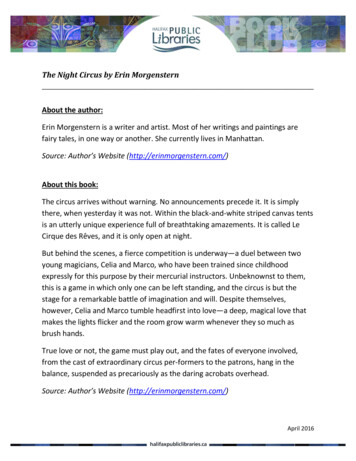
Transcription
The Night Circus by Erin MorgensternAbout the author:Erin Morgenstern is a writer and artist. Most of her writings and paintings arefairy tales, in one way or another. She currently lives in Manhattan.Source: Author’s Website (http://erinmorgenstern.com/)About this book:The circus arrives without warning. No announcements precede it. It is simplythere, when yesterday it was not. Within the black-and-white striped canvas tentsis an utterly unique experience full of breathtaking amazements. It is called LeCirque des Rêves, and it is only open at night.But behind the scenes, a fierce competition is underway—a duel between twoyoung magicians, Celia and Marco, who have been trained since childhoodexpressly for this purpose by their mercurial instructors. Unbeknownst to them,this is a game in which only one can be left standing, and the circus is but thestage for a remarkable battle of imagination and will. Despite themselves,however, Celia and Marco tumble headfirst into love—a deep, magical love thatmakes the lights flicker and the room grow warm whenever they so much asbrush hands.True love or not, the game must play out, and the fates of everyone involved,from the cast of extraordinary circus per-formers to the patrons, hang in thebalance, suspended as precariously as the daring acrobats overhead.Source: Author’s Website (http://erinmorgenstern.com/)April 2016
Discussion Questions:1. The novel opens with a quote from Oscar Wilde: “A dreamer is one who canonly find his way by moonlight, and his punishment is that he sees the dawnbefore the rest of the world.” How is this sentiment explored in The Night Circus?Who in the novel is a dreamer? And what is his or her punishment for being so?2. The novel frequently changes narrative perspective. How does this transitionshape your reading of the novel and your connection to the characters and thecircus? Why do you think the author chose to tell the story from variedperspectives?3. The narrative also follows a non-linear sequence—shifting at times frompresent to past. How effective was this method in regards to revealing conflict inthe novel?4. There are a number of allusions to Shakespeare throughout the text: Hamlet,Romeo and Juliet, The Tempest, and As You Like It. Explain these references—how does each play reveal itself in the novel?5. What role does time play in the novel? From Friedrick Thiessen’s clock to thedelayed aging of the circus developers to the birth of the twins—is timemanipulated or fated at the circus?6. “Chandresh relishes reactions. Genuine reactions, not mere polite applause. Heoften values the reactions over the show itself. A show without an audience isnothing, after all. In the response of the audience, that is where the power ofperformance lives.” How does this statement apply to both Le Cirque des Rêvesand the competition? Which audience is more valuable: one that is complicit orone that is unknowing?April 2016
7. Chandresh is portrayed as a brilliant and creative perfectionist at the beginningof the novel, yet he slowly unravels as the competition matures. Is Chandreshmerely a puppet of the competition—solely used for his ability to provide a venuefor the competition—or do his contributions run deeper?8. Marco asserts that Alexander H. is a father figure to him (though his paternalinstincts aren’t readily noticeable). In what ways does Alexander provide forMarco and in what ways has he failed him?9. Celia emphasizes that keeping the circus controlled is a matter of “balance.”And Marco suggests that the competition is not a chess game, but rather, abalancing of scales. However, both the circus and the competition get disorderedat times—leaving both physical and emotional casualties in their wake. Is thecircus ever really in “balance,” or is it a pendulum swinging from one extreme tothe next?10. From the outside, the circus is full of enchantments and delights, but behindthe scenes, the delicate push and pull of the competition results in some sinisterevents: i.e., Tara Burgess and Friedrick Thiessen’s deaths. How much is thecompetition at fault for these losses and how much is it the individual’s doing?11. How do you view the morality of the circus in regards to the performers anddevelopers being unknowing pawns in Celia and Marco’s competition? Do Celiaand Marco owe an explanation to their peers about their unwitting involvement?12. Friedrick Thiessen asserts that he thinks of himself “not as a writer so much assomeone who provides a gateway, a tangential route for readers to the circus.”He is a voice for those unable to attend the circus and suggests that the circus isbigger than itself. What role do the rêveurs play in keeping the spirit of the circusalive outside of the confines of the circus tents?13. What is Hector’s role in determining the final fate of the competition? Helectures Celia about remaining independent and not interfering with her partner,April 2016
but ultimately, Hector largely influences the outcome of the competition. Explainthis influence.14. Poppet and Widget are especially affected by the lighting of the bonfire. Howcrucial are their “specialties” to the ongoing success of the circus?15. Isobel is a silent, yet integral, partner in both the circus and the competition.She has an ally in Tsukiko, but seemingly no one else, especially not Marco. Howmuch does Marco’s underestimation of Isobel affect the outcome of thecompetition?16. How does Isobel serve as a foil to Celia? Who, if anyone, fills that role forMarco?17. Tsukiko is aware of Isobel’s “tempering of the circus” from the outset andwhen Isobel worries that it is having no effect, Tsukiko suggests: “perhaps it iscontrolling the chaos within more than the chaos without.” What, and whose,chaos is Tsukiko alluding to here?18. Mr. Barris, Friedrick Thiessen, Mme. Padva, and even Bailey are aware thatthe circus has made a profound, inexplicable change in their lives, but they eachchoose not to explore the depth of these changes. Friedrick Thiessen confirmsthat, “I prefer to remain unenlightened, to better appreciate the dark.” Do youagree with this standpoint? What inherent dangers accompany a purposefulignorance? What dangers present themselves when ignorance is not chosen? Isone choice better/safer than the other or are they equally fraught?19. Celia tells Bailey that he is “not destined or chosen” to be the next proprietorof the circus. He is simply “in the right place at the right time . . . and care[s]enough to do what needs to be done. Sometimes that’s enough.” In thissituation, is that “enough?” Can the responsibility of maintaining the circus betrusted to just anyone, or unlike Celia suggests, is Bailey truly special?April 2016
20. At the closing of the novel, we are left to believe that the circus is stilltraveling—Bailey’s business card provides an email address as his contactinformation. How do you think the circus would fare over time? Would the circusneed to evolve to suit each generation or is it distinctive enough to transcendtime?Source: Penguin Random House (http://www.penguinrandomhouse.com/)Other formats available at Halifax Public Libraries:- Audiobook (Digital)- eBook- FrenchApril 2016
About this book: The circus arrives without warning. No announcements precede it. It is simply there, when yesterday it was not. Within the black-and-white striped canvas tents is an utterly unique experience full of breathtaking amazements. It is called Le Cirque des Rêves, and it is only open at night.


